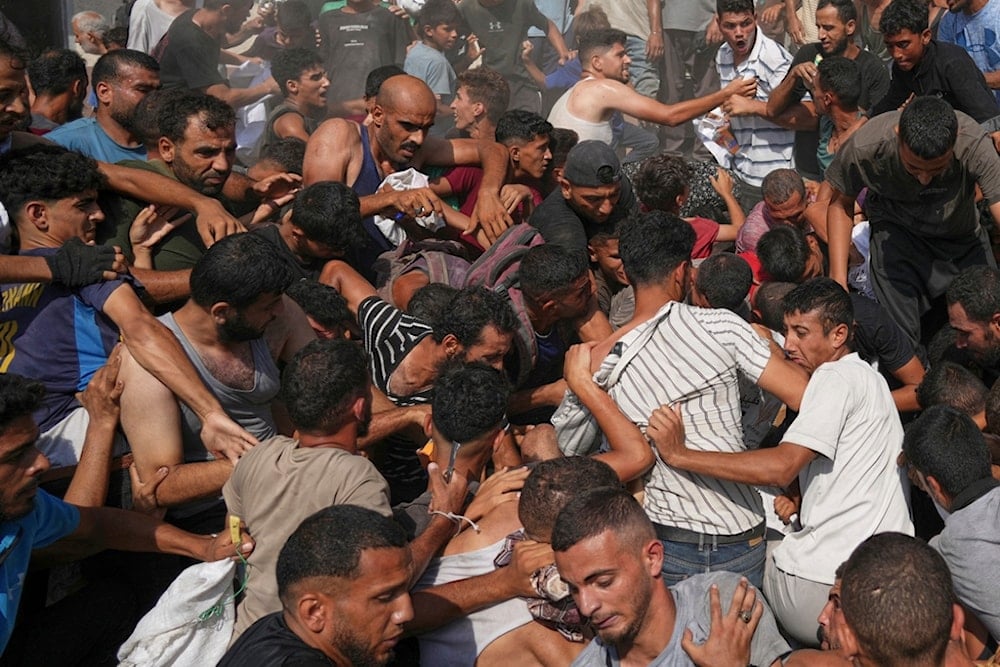BCG staff quitting central to internal probe into group's role in Gaza
Boston Consulting Group is facing scrutiny after consultants quit a Gaza aid project tied to the Israeli regime, raising ethical concerns and triggering an internal probe.
-

Palestinians struggle to collect humanitarian aid airdropped by parachutes into Gaza City, northern Gaza Strip, Thursday, August 14, 2025 (AP)
Boston Consulting Group (BCG) is embroiled in controversy over its role in shaping the Gaza Humanitarian Foundation (GHF), an Israeli-backed initiative heavily criticized by international agencies. The firm is now the subject of an independent inquiry after several of its own consultants resigned in protest during the project’s earliest stages.
According to an investigation by the Financial Times, four BCG staff members withdrew from the assignment soon after it began, citing profound ethical and reputational concerns. Three of them left within a single day of being placed on the project, while another, a former military officer, documented a series of legal and image-related risks before stepping down. Among the issues raised were the reliance on private US security firms and the absence of backing from multilateral organizations.
These resignations have since become central to an internal review led by the law firm WilmerHale, which BCG appointed to examine what it has described as failures in how the project was handled.
From ‘Project Aurora’ to collapse
The consultancy was brought in on a pro bono basis in October 2023 by Orbis, a US security contractor linked to an Israeli think tank, to help design the GHF. Inside BCG, the assignment was referred to as “Project Aurora” and handled by the firm’s US defense team.
Internal records later suggested that senior leaders at BCG were misinformed about the reasons behind the staff walkouts, with project partners accused of concealing critical details. The mounting dissent ultimately led BCG to sever its ties just days before the GHF was launched in May 2025. In the fallout, two partners were dismissed and two senior executives were removed from their posts.
BCG chief executive Christoph Schweizer described the episode as “deeply painful and profoundly disappointing.”
Widespread condemnations
The GHF has faced strong opposition from humanitarian agencies and the United Nations, which have accused the project of serving as a political tool for Israeli war aims while eroding core humanitarian principles.
Further controversy followed when the Financial Times disclosed that BCG consultants had prepared financial projections for Israeli business figures associated with the foundation. The models reportedly included cost estimates for relocating Palestinians from Gaza to countries such as Somalia.
Several organizations that had previously worked with BCG, including UN-affiliated bodies, have since suspended collaboration with the consultancy while awaiting the results of the WilmerHale investigation.
Funding questions intensify
Public scrutiny of the GHF grew sharper after a Channel 4 News report revealed that the initiative received approximately $30 million from the administration of US President Donald Trump, alongside financial support from a number of Western European governments.
BCG has sought to defend its conduct, claiming its consultants were not permitted to enter Gaza, that staff from Israeli and regional offices were excluded, and that the project had been internally presented as having wide international support. These assertions, however, have been widely discredited.
A Guardian investigation has documented systematic gunfire near food distribution sites in Gaza operated by the US- and Israeli-backed Gaza Humanitarian Foundation (GHF), resulting in more than 2,000 Palestinian injuries over a 48-day period, the majority caused by gunshot wounds.
According to the newspaper’s analysis of over 30 videos recorded near GHF locations, bursts of machine-gun fire could be heard on at least 11 separate days. Bullet casings recovered from wounded patients and ballistic assessments by independent weapons experts indicated the rounds were consistent with Israeli military munitions.
Targeted fire, consistent patterns
Medical professionals in Gaza also reported patterns in the wounds. Prof Nick Maynard, a consultant surgeon from Oxford University Hospital who has completed several missions to Nasser Hospital, said that injuries often clustered around the same body parts on food distribution days, suggesting targeted fire. “The other night, we admitted four teenage boys, all of whom have been shot in the testicles,” he told The Guardian.
Goher Rahbour, another surgeon at Nasser, said that in every mass-casualty incident involving patients from GHF sites, “100% of the time, [they said] it’s from the Israeli forces.” The Red Cross field hospital in Rafah admitted more than 2,200 patients from 21 separate incidents between May 27 and June 26, according to admission logs reviewed by the paper.
The Israeli occupation forces had alleged that Hamas had stolen aid, a claim the European Commission has found no evidence to support. The Guardian notes that the GHF began operating after the Israeli regime promised to lift its siege to allow the organization in, while veteran aid agencies, such as UNRWA, were denied access. Violence was reported from the outset, with more than 400 people injured and 30 declared dead on arrival at the ICRC field hospital in the first week alone.

 5 Min Read
5 Min Read










